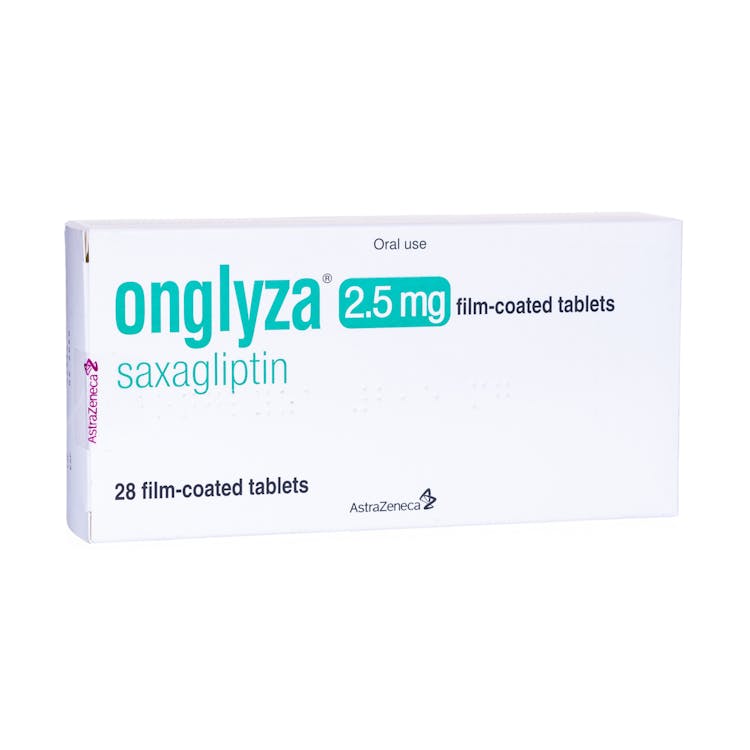- Home
- Onglyza
Onglyza
Images for illustrative purposes only
Onglyza is a tablet medication used to help control blood sugar levels in people who have been diagnosed with type 2 diabetes. It contains the active ingredient saxagliptin.
Taking an anti-diabetes medication can lead to low blood sugar levels and hypos, especially if you take saxagliptin with another medication to treat diabetes. It is important that you recognise the symptoms of hypoglycaemia, which include feeling shaky, anxious, sweaty, or dizzy.
- Controls high blood sugar
- Treats diabetes symptoms
- Lowers risk of serious health problems
- Genuine medication
- Shipped from EU Pharmacies
More information
About Onglyza
- Onglyza is the brand name for the medication saxagliptin
- Onglyza lowers blood sugar levels, helping to keep the level within a healthy, normal range
- Onglyza may be prescribed when another medication has not reduced blood sugar levels enough
- Onglyza can be used in combination with other medications for diabetes including metformin, insulin, and sulfonylureas
- It is important to read the patient leaflet for a full list of side effects and cautions.
What is Diabetes?
Our bodies rely on insulin which is made by the pancreas. Insulin helps to control the amount of glucose (sugar) in the blood. If the body starts to make less insulin, our blood sugar levels are left to rise unchecked. In some people, the body has also stopped responding properly to any insulin that is being produced. The rising blood sugar levels will lead to diabetes.
High levels of glucose in the blood over a prolonged period can cause damage to the blood vessels, nerves, kidneys, and eyes. Some patients will eventually require amputation of extremities including the toes or feet. It is therefore very important to keep your blood glucose levels under control, even if you currently feel well.
How Does Onglyza Work?
Onglyza is a dipeptidylpeptidase-4 inhibitor. It works by increasing insulin secretion in the pancreas, helping to lower blood sugar levels. It also reduces glucagon secretion. Glucagon stimulates the liver to release sugar into the bloodstream, so by inhibiting glucagon secretion, blood sugar levels start to fall.
It may take several months to notice a steady reduction in your regular blood sugar levels. It is therefore important to see this as a long term treatment and take your medication regularly.
Onglyza is only prescribed for type 2 diabetes, and is not used to treat type 1 diabetes.
How is Onglyza Taken?
Onglyza is a tablet medication. It is usually swallowed once daily with some water. The tablet can be taken with or without food.
Dosage of Onglyza
The most common dose of Onglyza is 5mg once daily. However, a 2.5mg tablet is available for those who require a lower dose. Your doctor may prescriber a lower dose if you have severe kidney disease, or if your blood sugar levels fall too low.
Are there any Side Effects?
Like all medications, Onglyza can have some side effects. The most common side effects include:
- Headache
- Chest infections (upper respiratory tract infections)
- Urinary tract infections (water infection or a UTI)
- Gastroenteritis (infection of the digestive system)
- Sinusitis (infection or inflammation of the sinuses)
- Dizziness
- Nausea or vomiting (feeling sick or being sick)
- Tiredness.
If you think you have developed an infection, you should speak to your doctor as you may require antibiotic treatment. The other side effects are likely to settle down, but if they persist or become troublesome you should speak to your doctor for further advice.
When taking Onglyza with another medication, there is a risk of hypoglycaemia (a hypo or low blood sugar level) occurring. Hypos should be treated immediately with a sugary sweet or drink, and medical assistance.
Serious allergic reactions happen very rarely. If you have a severe allergic reaction (anaphylaxis) including breathlessness, lip swelling or tongue swelling, call 999 immediately.
Onglyza Warnings
Onglyza may not be suitable for everyone. You should tell your prescriber if you:
- Have liver disease
- Have kidney disease
- Have ever had an allergic reaction to any medication
- Have ever had pancreatitis
- Are pregnant, trying to conceive, or breastfeeding – in rare cases Onglyza may be prescribed, but other anti-diabetes medications are more commonly prescribed in these circumstances.
Your prescriber can then advise whether Onglyza is a suitable medication for you.
Some medications can interact with Onglyza. You may be advised that Onglyza will not suit you if you already take:
- Rifampicin
- Medications to treat seizures or epilepsy
- Steroids
- Diltiazem
- Ketoconazole.
Because Onglyza may not suit everyone, we will complete a Consultation with you including a health questionnaire. This will ensure that the medication will be suitable for you.
A qualified prescriber will review your current medications, including any herbal remedies or supplements, to ensure that Onglyza will not interact with them.
Once prescribed, Onglyza will be ordered on your behalf via electronic prescription. Onglyza will then be conveniently dispatched from one of our partner pharmacies.
Buy Onglyza
Buying Onglyza Online
Can I buy Onglyza online?
You can safely buy Onglyza online at EU Meds. You will first need to have an online consultation with a pharmacist independent prescriber before your order will be supplied. The online consultation will ensure that Onglyza is the right medication for your medical condition.
Do I need a prescription for Onglyza?
Yes, in order to purchase Onglyza you will need a valid prescription. Please note, all requests for supply of prescription medications are subject to an online clinical consultation and the decision to prescribe will be made by a doctor.

Here to help you
Our Customer Service is available Monday to Friday 9am - 4pm. If you need urgent assistance, do not use this service. Call 111, or in an emergency call 999. Visit our help section



